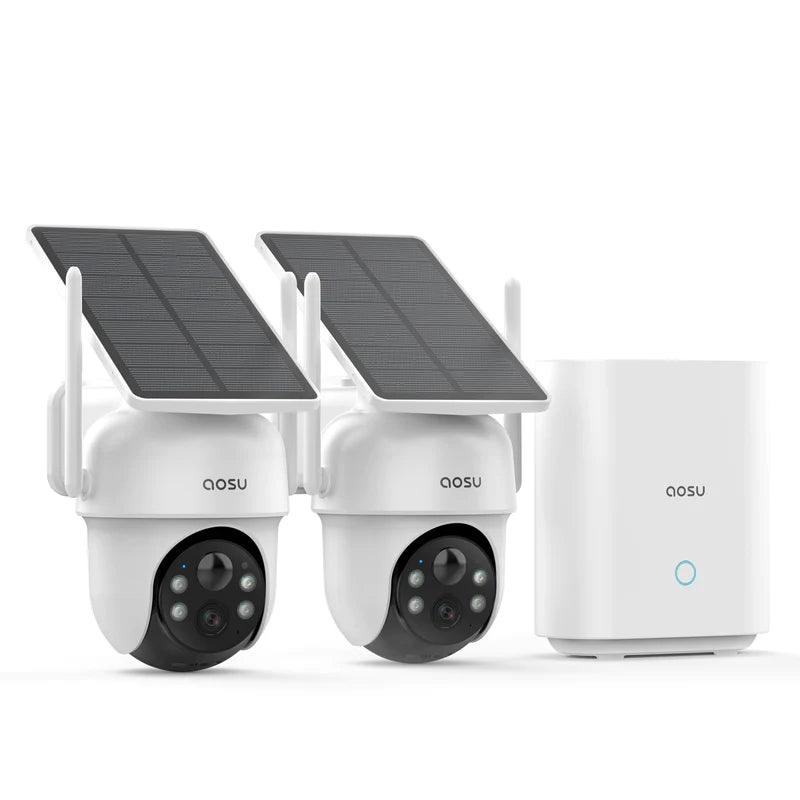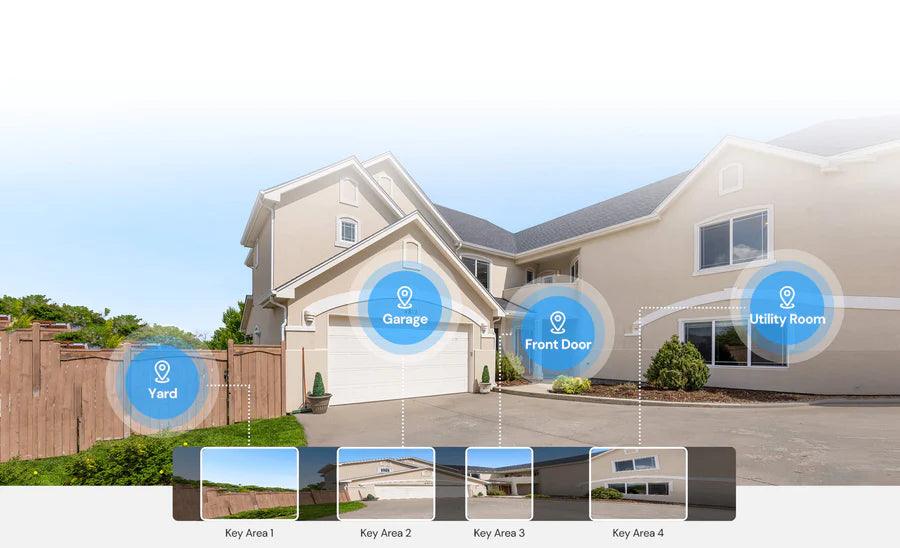Solar camera technology, harnessing the sun's power for surveillance, is gaining momentum in the security industry. These innovative devices offer a greener, more flexible solution to monitoring, eliminating the need for electrical wiring and reducing energy costs. This blog delves into the wide-ranging applications of solar cameras, from safeguarding homes to monitoring remote wildlife, highlighting their versatility and the shift towards more sustainable security measures. Join us as we explore how solar cameras are redefining surveillance and offering solutions well beyond traditional security boundaries.
1.Enhancing residential security with solar cameras
By providing a sustainable, flexible, and user-friendly alternative to traditional surveillance systems, solar cameras are transforming home security nowadays. Here, we explore the key benefits of integrating solar cameras into residential security setups and how they compare to conventional wired systems.

Benefits of solar cameras for home surveillance
- Ease of Installation: Solar cameras can be mounted and operational in a fraction of the time it takes to install wired cameras, with no need to drill through walls for cables or require close proximity to power outlets.
- Cost-Effectiveness: They eliminate the need for electrical wiring and reduce long-term energy costs, offering significant savings over time. Additionally, many models come with no monthly fees for basic storage and access features.
- Environmental Impact: By utilizing renewable energy, solar cameras have a lower carbon footprint, making them an eco-friendly choice for conscientious homeowners.
Comparative analysis with traditional wired home security systems
- Installation Flexibility: Unlike wired systems that are limited by the location of power sources and the complexity of wiring, solar cameras can be placed virtually anywhere sunlight is available.
- Reliability: Solar cameras continue to operate during power outages, providing uninterrupted surveillance, whereas traditional systems may require backup power solutions.
- Maintenance: Solar cameras often require less maintenance than wired systems, as there are no cables to check or replace and the technology is generally more resistant to wear and weather.
- Cost: Initial setup costs for solar cameras can be higher, but the absence of ongoing electricity costs and potentially lower maintenance expenses can make them more economical over time.
- Performance: While traditional wired systems are known for their reliability and constant power supply, modern solar cameras have made significant advancements in battery life and solar efficiency, closing the gap in performance.
As technology continues to advance, solar cameras are becoming an increasingly popular choice for homeowners looking to enhance their residential security in a sustainable way.
2.Solar cameras in commercial spaces
The versatility and sustainability of solar cameras make them an ideal choice for businesses looking for effective monitoring and asset protection solutions. Especially beneficial for remote or temporary sites, solar cameras offer a set of unique advantages that traditional surveillance systems can't match.

Applications in business monitoring and asset protection
- Remote Monitoring: For businesses operating in remote locations where traditional power sources are scarce, solar cameras provide a reliable surveillance solution, ensuring continuous operation without the need for complex wiring or generators.
- Temporary Sites: Construction sites, pop-up events, and other temporary commercial activities benefit from solar cameras' easy deployment and removal, offering security without long-term infrastructure investments.
- Eco-friendly Operations: Companies aiming to reduce their environmental footprint find solar cameras align with their sustainability goals, offering a green alternative to conventional security systems.
Advantages in remote or temporary commercial sites
- Self-Sufficiency: Solar cameras operate independently of the grid, making them perfect for locations without easy access to electrical infrastructure.
- Cost Savings: By avoiding the need for electrical installation and reducing ongoing energy costs, businesses can allocate resources more efficiently elsewhere.
- Flexibility:The ease of installing and relocating solar cameras allows businesses to adapt their security measures as needs change, without significant additional costs.
Businesses adopting solar-powered surveillance
- Construction Site Monitoring: A construction company deployed solar cameras across multiple sites, resulting in a significant reduction in theft and vandalism, thanks to the cameras' motion detection and instant alert features.
- Agricultural Surveillance: A farm utilized solar cameras to monitor remote fields and livestock, improving operational efficiency and security while supporting the farm's commitment to sustainability.
- Retail Security: A retail chain implemented solar cameras in their parking lots, enhancing customer safety and reducing incidents of vehicle break-ins, demonstrating the system's effectiveness in high-traffic commercial environments.
These examples highlight the practicality and effectiveness of solar cameras in commercial spaces, proving that they are not only viable for enhancing security but also offer operational and environmental benefits. As businesses continue to seek innovative and sustainable solutions, solar cameras stand out as a powerful tool in the modern security arsenal, adaptable to a wide range of commercial applications.
3.Industrial and infrastructure monitoring
Solar cameras are making significant inroads into industrial and infrastructure monitoring, offering a versatile and eco-friendly solution that stands in contrast to conventional surveillance systems. Their application in construction, industrial operations, and pipeline monitoring showcases the logistical benefits and efficiency improvements these devices bring to challenging environments.

Use in construction and industrial operations
- Construction Site Surveillance:Solar cameras provide real-time monitoring of construction sites, enhancing security, tracking progress, and ensuring compliance with safety standards without the need for wired power sources.
- Industrial Facility Monitoring: In industrial settings, they offer a flexible solution for overseeing production areas, storage facilities, and perimeter security, especially in sections difficult to power traditionally.
Pipeline and infrastructure monitoring
- Remote Pipeline Surveillance:Solar cameras are deployed along pipelines, including in remote or environmentally sensitive areas, to monitor for leaks, unauthorized access, or infrastructure damage, where running power lines would be impractical or too expensive.
- Infrastructure Health Monitoring: They can also be used to monitor the condition of critical infrastructure, such as bridges and roads, providing valuable data for maintenance and safety assessments.
Logistical benefits of solar cameras
- Deployment Flexibility: The ability to install cameras without needing access to the power grid opens up surveillance possibilities in previously inaccessible locations.
- Reduced Installation and Operation Costs:Eliminating the need for electrical infrastructure lowers both upfront installation costs and ongoing energy expenses.
- Sustainability: Solar cameras align with green initiatives, reducing the carbon footprint associated with traditional surveillance methods.
Comparison with conventional surveillance solutions
- Power Reliability:While conventional systems rely on a constant power supply, solar cameras use renewable energy with battery backup, ensuring continuous operation even during power outages.
- Installation Constraints: Traditional wired surveillance systems often require significant infrastructure, which can be disruptive and limit where cameras can be placed. Solar cameras overcome these constraints with their wireless nature.
- Maintenance and Flexibility: Solar cameras typically require less maintenance than wired systems, especially in harsh or remote industrial environments. Their portability allows for easy relocation to address changing surveillance needs.
In conclusion, solar cameras offer substantial logistical and environmental benefits for industrial and infrastructure monitoring, challenging traditional surveillance paradigms. With advancements in solar technology and battery storage, they are becoming an increasingly viable option for a wide range of industrial applications, providing a sustainable, flexible, and cost-effective solution for monitoring complex operations and critical infrastructure.
Introducing aosu Solar Camera Kit
Having discussed the common applications of solar cameras, we now introduce the aosu Solar Camera Kit, distinguished in the market by its comprehensive and advanced features. Let’s explore the advantages it offers!

- Equipped with Homebase: The aosu Solar Camera Kit includes a Homebase unit, which is responsible for storing encrypted recordings locally, ensuring that your surveillance footage is securely archived without reliance on cloud storage. The Homebase enhances the security system's reliability and data privacy, offering users direct access to their recordings.
- No Monthly Fee:The local storage capability provided by the Homebase allows recordings to be stored for up to 2 months without monthly subscription fees. This feature represents a significant cost-saving advantage, ensuring that users enjoy a high-quality security solution without ongoing expenses.
- 2K Resolution: The aosu Solar Camera Kit delivers high-definition images with a 2K resolution, ensuring that every detail is captured with clarity. This feature enhances the surveillance capabilities by providing sharper images.
- Auto Motion Tracking:Equipped with advanced motion tracking technology, this camera automatically follows movement within its field of vision. This ensures comprehensive monitoring and reduces the chances of missing any important activity.
- 360° Pan-Tilt View: Offering a full 360° pan-tilt capability, the camera covers every angle of the surrounding area. This eliminates blind spots and provides a panoramic view for complete surveillance coverage.
- IP65 Weatherproof: The camera is designed to withstand harsh weather conditions, thanks to its IP65 weatherproof rating. This makes it ideal for outdoor use, ensuring reliable performance in environments exposed to rain, dust, and other elements.
- Integrated Design of the Solar Panel and Camera: The solar panel and camera are seamlessly integrated into a single unit. This innovative design not only conserves space but also simplifies the installation process. Users no longer need to find separate spots for installing the solar panel, making it a space-efficient and aesthetically pleasing solution.
In summary, the aosu Solar Camera Kit truly stands out with its advanced features and user-friendly design. Offering everything from crystal-clear resolution to weather resistance and easy installation — all without monthly fees — it's an excellent choice for enhancing security with minimal hassle. It's the ideal blend of sophistication and practicality for those looking to secure their premises.
Summing up
Solar cameras have revolutionized surveillance, offering adaptable solutions for homes, industries, and commercial spaces alike. Their benefits extend beyond simple monitoring, bringing energy efficiency, environmental sustainability, and unmatched reliability to the forefront of security technology. By harnessing solar power, these cameras promise a future where security systems are not only more versatile and cost-effective but also aligned with global sustainability goals. Embracing solar camera technology represents a forward-thinking approach to safety, ensuring a greener, more secure tomorrow.










Zostaw komentarz
Ta strona jest chroniona przez hCaptcha i obowiązują na niej Polityka prywatności i Warunki korzystania z usługi serwisu hCaptcha.